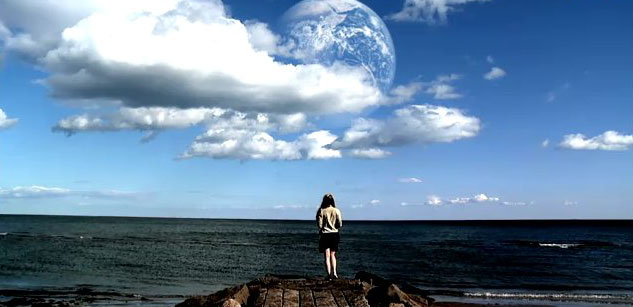Culture
Fatally “Earth”bound

Another Earth
dir. Mike Cahill
Release Date: Jul 29, 11
- 1
- 2
- 3
- 4
- 5
- 6
- 7
- 8
- 9
- 10
There is a film buried within Another Earth that is far more interesting than the one that actually made it to the screen. A key scene halfway through the film lets that film peek out for a moment, when a scientist attempts to establish radio contact with a planet that has entered our orbit, resembling our own in every way. The reciever of the call on the other end is her, or at least claims to be her. But then, would the “her” on the other Earth be the double? Or would she? If there are doubles of all of us, did our lives unfold in the exact same way? Would this second planet give us a second chance?
Those are the questions that, when it really fires on all cylinders (which isn’t often), Another Earth explores. Rhoda (newfound indie wunderkind Brit Marling), upon finding out she’d been accepted into MIT’s space research program, went out to celebrate. While driving home drunk, the second Earth made its first visible entry into our orbit. Distracted, Rhoda got into a full-speed car crash with lethal consequences, and ended up serving four years in prison. The film begins four years later, when Rhoda is released to a loving but tentative family, into a world in which she has no real future.
Here’s where things start to go wrong. Rhoda ends up taking a job as a school janitor, which leads to countless shots of her wandering, in dour clothing designed to downplay the fact that Marling is ethereally beautiful, through halogen-washed school hallways, or open streets dwarfed by this massive second planet. At least these moments, overcooked though they are, have a certain visual poetry to them; director Mike Cahill creates an almost apocalyptic dreamscape that suits Rhoda’s total existential detachment.
The real tragedy of Another Earth is when it makes an ambling lunge for tragedy, in the form of a dead-child melodrama involving Rhoda and John (William Mapother), a former composer who now sits in his home, mourning his lost wife and child. Rhoda becomes his cleaning lady, inevitably forms an emotional connection with him and becomes increasingly torn at the Big Secret that threatens to tear them apart.
By now, if you’ve ever watched a ponderous “everything is connected” drama, you know what that secret is, and also exactly where the narrative is headed. Marling and Cahill’s script does them no favors by downplaying the intriguing sci-fi elements in the film, instead letting them stand as a metaphorical bridge to a trite redemption narrative that not even Mapother’s strong performance can save. Marling is only asked to look wan and sad-eyed, and she does this capably, but it’s not a particularly engaging leading turn.
It’s highly unusual that Fox Searchlight would pick this up, because there’s seemingly no major hook for crossover potential. The film meanders along the way to inevitable climactic beats and a final shot that will only be a thought-provoking surprise for audiences who’ve not been paying attention to anything that’s happened in the previous 90-odd minutes. Another Earth wants to be a think piece in the vein of Moon, but comes off more like a Lifetime movie directed by Sofia Coppola.
(Note: For as much as I’ve spoken ill of Marling here, I find her quite talented. Her other Sundance hit, Sound of My Voice, has also been picked up by Fox Searchlight, and is a far better movie. Keep an eye out later this year.)